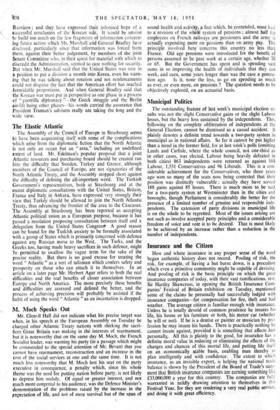Insurance and the Citizen
How and where insurance in any proper sense of the word began authentic history does not record. Pooling of risk, the risk, for example, of having a but burnt down, is a procedure which even a primitive community might be capable of devising. And pooling of risk is the basic principle on which the great insurance companies of today, with their vast ramifications, rest. Sir Hartley Shawcross, in opening the British Insurance Com- panies' Festival of Britain exhibition on Tuesday, mentioned some of the claims he personally had successfully lodged with insurance companies—for compensation for fire, theft and bad weather. The average citizen is familiar enough with insurance. Unless he is totally devoid of common prudence he insures his life, his house or his furniture or both, his motor car (whether he will or not). If he is a dentist or painter or musician by pro- fession he may insure his hands. There is practically nothing he cannot insure against, provided it is something that affects him personally. All this is plainly to the good, for insurance has a definite moral value in reducing or eliminating the effects of the changes and chances of this mortal life, and putting life itself on an economically stable basis, enabling man thereby to plan intelligently and with confidence. The extent to which insurance, as an invisible export, is helping the national trade balance is shown by the President of the Board of Trade's state- ment that British insurance companies are earning something like £33,000,000 a yea!' for this country. The companies are fully warranted in mildly drawing attention to themselves in this Festival Year, for they are rendering a very real public service, and doing it with great efficiency.






































 Previous page
Previous page